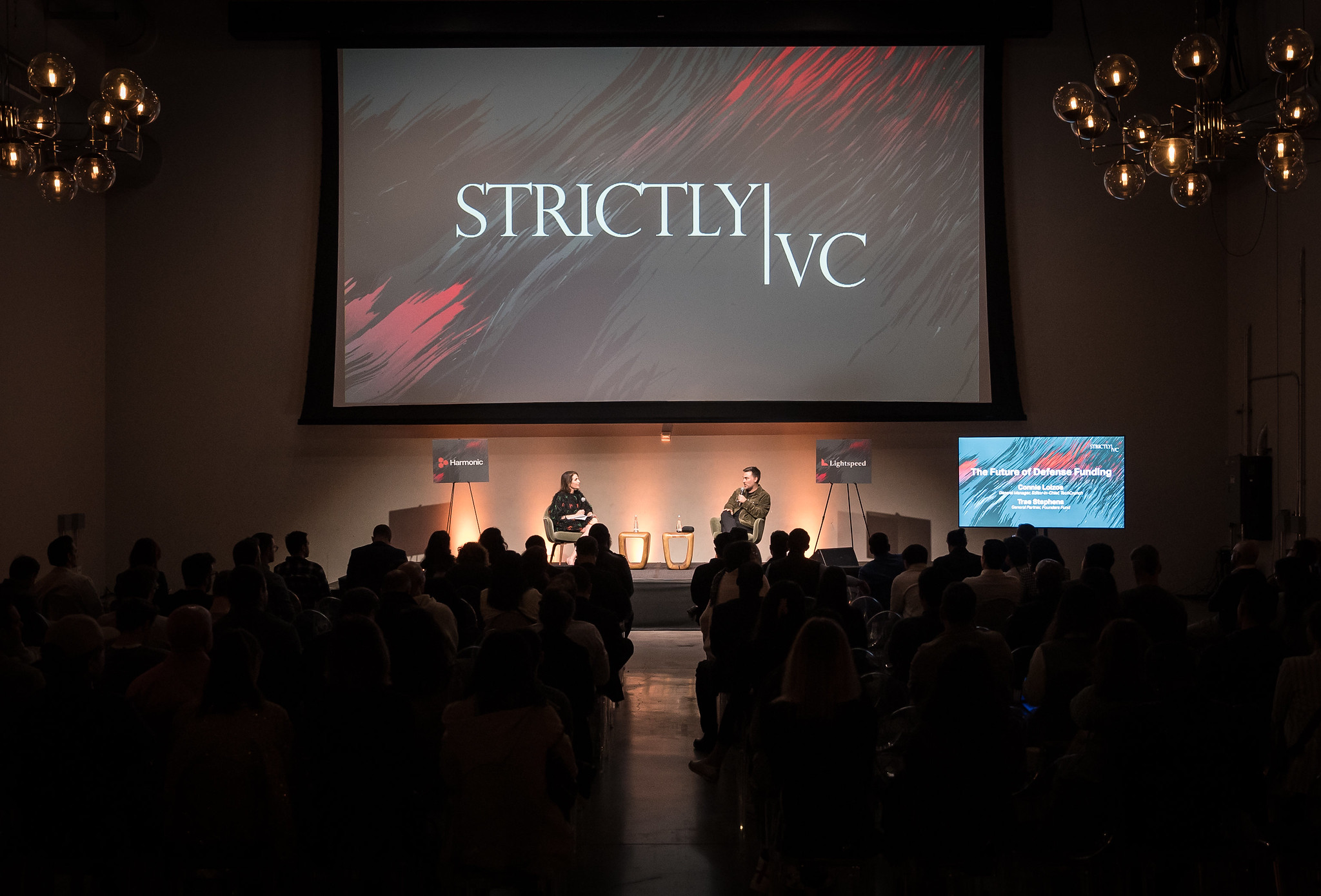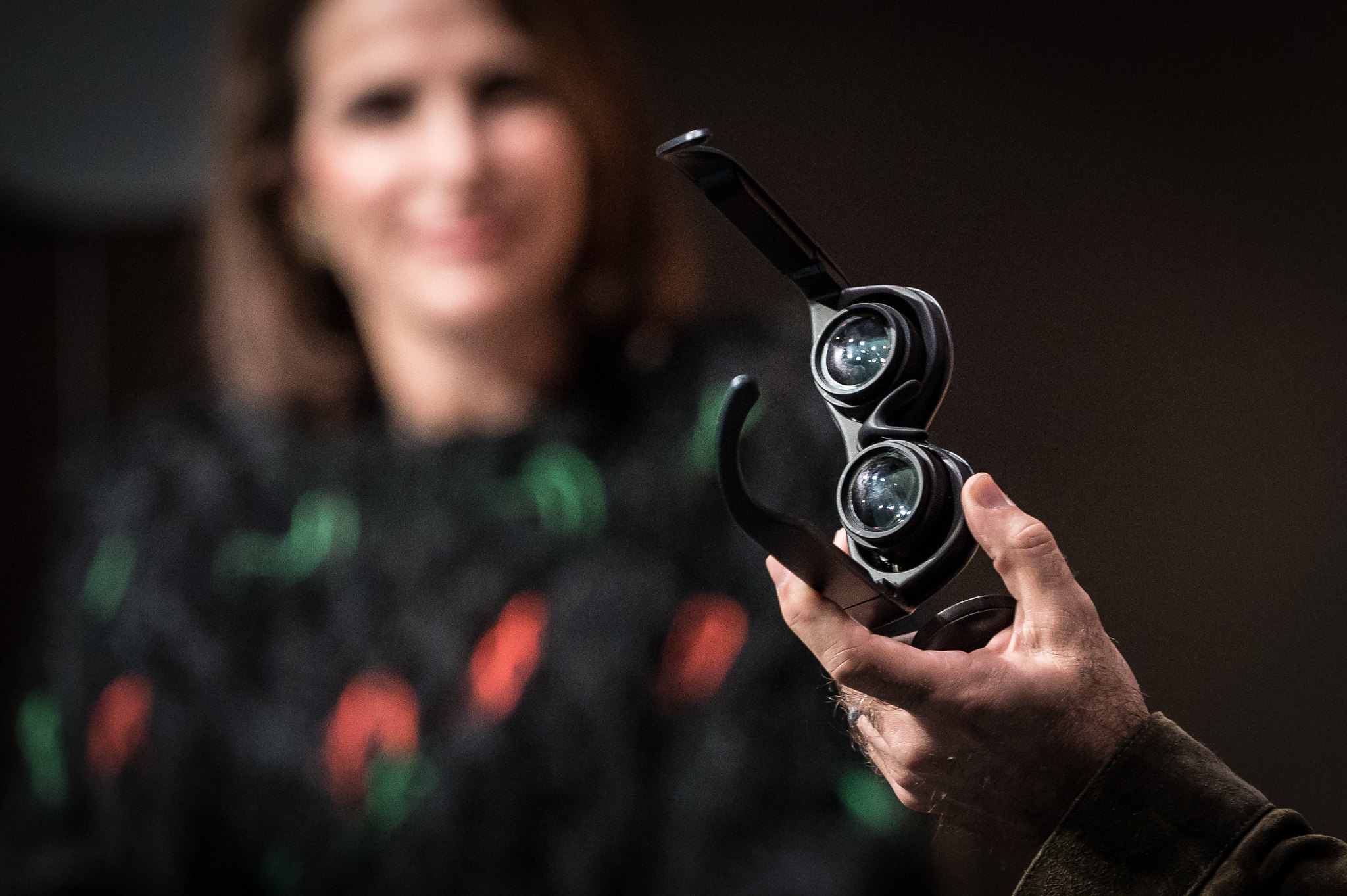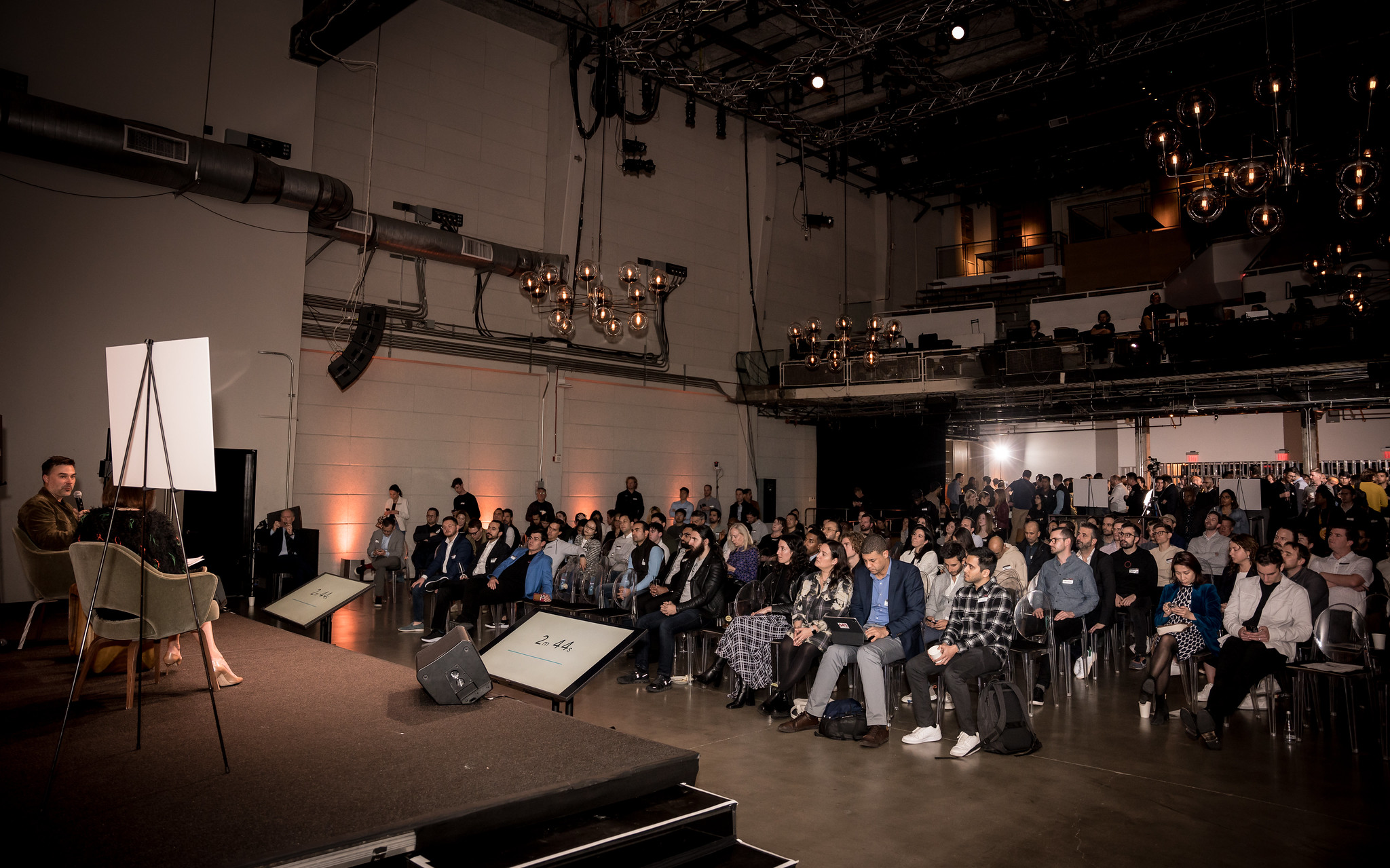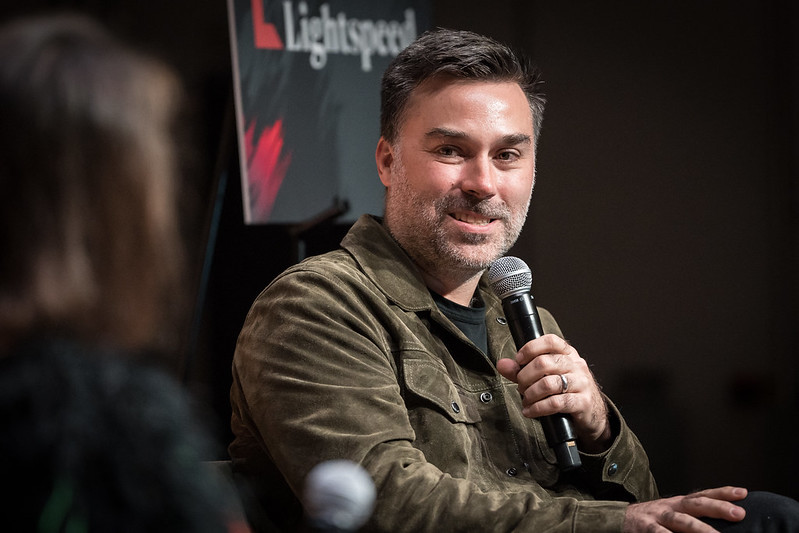Last night, for an evening hosted by StrictlyVC, this editor sat down with Trae Stephens, a former government intelligence analyst turned early Palantir employee turned investor at Founders Fund, where Stephens has co-founded two companies of his own. One of these is Anduril, the buzzy defense tech company that is now valued at $8.4 billion by its investors. The other is Sol, which makes a single-purpose, $350 headset that weighs about the same as a pair of sunglasses and is focused squarely on reading, a bit like a wearable Kindle. (Having put on the pair that Stephens brought to the event, I immediately wanted one of my own, though there’s a 15,000-person waitlist right now, says Stephens.)
We spent the first half of our chat talking primarily about Founders Fund, kicking off the conversation by talking about how Founders Fund differentiates itself from other firms (board seats are rare, it doesn’t reserve money for follow-on investments, consensus is largely a no-no).
We also talked about a former colleague who manages to get a lot of press (Stephens rightly ribbed me for talking about him during our own conversation), whether Founders Fund has concerns that Elon Musk is stretching himself too thin (it has stakes in numerous Musk companies), and what happens to another portfolio company, OpenAI, if it loses too much talent now that it has let its employees sell some percentage of their shares at an $86 billion valuation.
The second half of our conversation centered on Anduril, and here’s where Stephens really lit up. It’s not surprising. Stephens lives in San Francisco but spends much of each day overseeing large swaths of the outfit’s operations in Costa Mesa, California. Anduril is also very much on the rise right now for obvious reasons.
If you’d rather watch the talk, you can catch it below. For those of you who prefer reading, what follows is much of that conversation, edited lightly for length.
Keith Rabois, who recently rejoined Khosla Ventures, was reported to have been “pushed out” of Founders Fund after a falling-out with colleagues. Can you talk a bit about what happened?
At Founders Fund, everyone has their own style. And one of the benefits that really comes down from Peter [Thiel] from the beginning, when we were first founded around 20 years ago, is that everyone should run their own strategy. I do strategy in a different way than [colleague] Brian [Singerman] does venture. It’s different than the way that Napoleon [Ta] — who runs our growth fund — does venture, and that’s good, because we get different looks that we wouldn’t otherwise get by having people executing these different strategies. Keith had a very different strategy. He had a very specific strategy that was very hands-on, very engaged, and I think Khosla is a very good fit for that … and I’m really happy that he found a place where he feels like he has a team that can back him up in that execution.

You’ve talked in the past about Founders Fund not wanting to back founders who need a lot of hand-holding …
The ideal case for a VC is you have a founder who is going to be really good at running their own business, and there’s some unique edge that you can provide to help them. The reality is that that’s usually not the case. Usually the investors who think they’re the most value added are the most annoying and difficult to deal with. The more a VC says, “I’m going to add value,” the more you should hear them say, “I’m going to annoy the ever-living crap out of you for the rest of the time that I’m on the cap table.” If we believe that we — Founders Fund — are necessary to make the business work, we should be investing in ourselves, not the founders.
I find it interesting that so much ink was spilled when Keith moved to Miami, and again when he moved back to the Bay Area in a part-time capacity. People thought Founders Fund had moved to Florida, but you’ve told me the bulk of the firm remains in the Bay Area.
The vast majority of the team is still in San Francisco … Even when I joined Founders Fund 10 years ago, it was really a Bay Area game. Silicon Valley was still the dominant force. I think if you look at fund five, which is the one I entered at Founders Fund, something like 60% to 70% of our investments were Bay Area companies. If you look at fund seven, which is the last vintage, the majority of the companies were not in the Bay Area. So whatever people thought about Founders Fund relocating to Miami, that was never the case. The idea was that if things are geographically distributed, we should have people who are closer to the other things that are interesting.
Keith said something earlier today at the [nearby] Upfront Summit about founders in the Bay Area being comparatively lazy and not willing to work nine to nine on weekdays or on Saturdays. What do you think about that and, also, do you think founders should be working those hours?
I used to work for the government, where, when you speak publicly, the goal is to say as many words as possible without saying anything … It’s just like the teacher from Charlie Brown. Keith is really good at saying things that journalists ask about later. That’s actually good for Keith. He made us talk about him here onstage. He wins. I think the reality is that there aren’t enough people in the world that say things that people remember that are worth talking about later. My goal for the rest of this talk is to find something to say that someone will ask about later today or tomorrow: “Can you believe Trae said that?”
I have a solution to that, but that comes later! OpenAI is a portfolio company; you bought secondary shares. It just oversaw another secondary sale. Its employees have made a lot of money (presumably) from these sales. Does that concern you? Do you have a stance on when is too soon for employees to start selling shares to investors?

In tech, the competition for talent is really fierce, and companies want their employees to believe that their equity has real monetary value. Obviously it would be bad if you said, “You can sell 100% of your vested equity,” but at a fairly early stage, I think it’s fine to say, “You’ve got 100,000 shares vested; maybe you can sell 5% to 10% of that in a company-facilitated tender, so that when you’re being compensated with equity, that’s real and that’s part of your total comp package.”
But the scale is so different. This is a company with an $86 billion valuation [per these secondary buyers], so 5% to 10% is a lot.
I think if you start seeing a performance degradation related to people checking out because they have too much liquidity, then yeah, that becomes a pretty serious problem. I haven’t seen that happen at OpenAI. I feel like they are super mission-motivated to get to [artificial general intelligence], and that’s a really meaty mission.
You’re also an investor in SpaceX. You’re an investor in Neuralink. Are you also an investor in Boring Company?
We’re an investor in Boring Company.
Are you an investor in X?
No. No, no, no, no. [Laughs.]
But you’re in the business of Elon Musk, as I guess anyone who’s an investor would want to be. Are you worried about him? Are you worried about a breaking point?
I’m not personally concerned. Elon is one of the most unique and generational talents that I think I’ll see for the rest of my life. There are always trade-offs. You go above a certain IQ point and the trade-offs become quite severe, and Elon has a set of trade-offs. He’s incredibly intense. He will outwork anyone. He’s brilliant. He’s able to organize a lot of stuff in his brain. And there are going to be other parts of life that suffer.
You are very involved in the day-to-day of Anduril, more than I realized. You’ve built these autonomous vessels and aircraft. You recently introduced the Roadrunner, a VTOL that can handle varying payloads. Can you give us a curtain raiser about what else you’re working on?
The nature of Anduril and what we’re doing there is that the threat that we’re facing globally is very different than it was in 2000 through 2020, when we were talking about non-state actors: terrorist organizations, insurgent groups, rogue states, things like that. It looks now more like a Cold War conflict against near-peer adversaries. And the way we engaged with great power conflict during the Cold War was by building these really expensive, exquisite systems: nuclear deterrents, aircraft carriers, multi-hundred-million-dollar aircraft missile systems. [But] we find ourselves in these conflicts where our adversaries are showing up with these low-cost attritable systems: things like a $100,000 Iranian Shahed kamikaze drone or a $750,000 Turkish TB2 Bayraktar or simple rockets and DJI drones with grenades attached to them with little gripper claws.
Our response to that has been historically to shoot a $2.25 million Patriot missile at it, because that’s what we have, that’s what’s in our inventory. But this isn’t a scalable solution for the future. So since we were founded, Anduril has looked at how [we can] reduce the cost of engagement, while also removing the human operator, removing them from the threat of loss of life … And these capabilities are not hardware capabilities largely. This is about autonomy, which is a software problem … so we wanted to build a company that’s software-defined and hardware-enabled, so we’re bringing these systems that are low cost and supplementing the existing capabilities to create a continued deterrent impact so that we avoid global conflict.
I’d read a story recently where someone from one of the defense “primes,” as they’re called, rolled their eyes and said defense tech upstarts don’t know enough yet about mass production. Is that a concern for you?
Startups don’t know how to do mass production. But primes also don’t know how to do mass production. You can look at the Boeing 737 problem if you want some evidence of that. We have no supply of Stingers, Javelins, HIMARS, GMLRS, Patriot missiles — they can’t make them fast enough. And the reason is they built these supply chains and manufacturing facilities that are more like the manufacturing facilities of the Cold War.
To look at an analogy to this, when Tesla went out to build at massive scale, they said, “We need to build an autonomous factory from the ground up to actually hit the demand requirements for producing at a low cost and at the scale that we need to grow.” And GM looked at that and they said, “That’s ridiculous. This company will never scale.” And then five years later, it was evident that they were just getting absolutely smoked. So I think the primes are saying this because it’s the defensive reaction that they would have to say these upstarts will never get it.
Anduril is trying to build a Tesla. We’re going to build a modular, autonomous factory that’s going to be able to keep up with the demand that the customer is throwing at us. It’s a big bet, but we hired the guy that did it at Tesla. His name is Keith Flynn. He’s now our head of production.

I’m sure you get asked a lot about the danger of autonomous systems. Sam Altman, at one of these events, told me years ago that it was among his biggest fears when it comes to AI. How do you think about that?
Throughout the course of human history, we’ve gotten more and more violent. We started with, like, punching each other and then hitting each other with rocks and then eventually we figured out metals and we started making swords and bows and arrows and spears, and then catapults and then eventually we got to the advent of gunpowder. And then we started dropping bombs on each other, and then in the 1940s, we reached the point where we realized we had humanity-destroying capability in nuclear weapons. Then everyone kind of stopped. And we stood around and we said, “It would not be good to use nuclear weapons. We can all kind of agree we don’t actually want to do this.”
If you look at the curve of that violent potential, it started coming down during the Cold War, where you had precision-guided munitions. If you need to take out a target, [the question became] can you shoot a missile through a window and only take out the target that you’re intending to take out? We got much more serious about intelligence operations so we could be more precise and more discriminating in the attacks that we delivered. I think autonomous systems are the far reach of that. It’s saying, “We want to prevent the loss of human life. What can we do to eliminate that, to the extent possible to be absolutely sure that when we take lethal action, we’re doing it in the most responsible way possible.” …
Am I scared of Terminator? Sure, there’s some potential hypothetical future where the AGI becomes sentient and decides that we will be better off making paper clips. We’re not close to that right now. No one in the DoD or any of our allies and partners is talking about sentient AGI taking over the world and that being the goal of the DoD. But in 2016, Vladimir Putin, in a speech to the Technical University of Moscow, said, “He who controls AI controls the world,” and so I think we have to be very serious about recognizing that our adversaries are doing this. They’re going to be building into this future. And their goal is to beat us to that. And if they beat us to it, I’d be much more concerned about that Terminator reality than if we, in a democratic Western society, are the ones that control the edge.
Speaking of Putin, what is Anduril doing in Ukraine?
We’re deployed all over the world in conflict zones, including Ukraine. You go into a conflict with the technology you already have, not with the technology you hope to have in the future. So much of the technology that the United States, the U.K., and Germany sent over to Ukraine were Cold War era technologies. We were sending them things that were sitting in warehouses that we needed to get out of our inventory as quickly as possible. Anduril’s goal, aside from supporting those conflicts, is to build the capabilities that we need to build, to ensure that the next time there’s a conflict, we have a big inventory of stuff that we can deploy very quickly to support our allies.
You’re privy to conversations that we probably can’t imagine. What is in your survival kit? And is it in a bunker?
I do have a bunker, I can confirm. What’s in my survival kit? I don’t think I have any interesting ideas here. It’s like, you want nonperishables. You want a big supply of water. It might not hurt to have some shotguns. I don’t know. Find your own bunker. It turns out you can buy Cold War era missile silos that make for great bunkers and there’s one for sale right now in Kansas. I would encourage any of you [in the audience] that are interested to check it out.
You’re obviously very passionate about this country. You worked in government service. You work with Peter Thiel, who has thrown his resources behind people who’ve been elected to public office, including now, Ohio senator J.D. Vance. Will we ever see you run for office?
I’m not personally opposed to the idea, but my wife — who I love very much — said she would divorce me if I ever ran for public office. So the answer is a strong no.































Kommentar